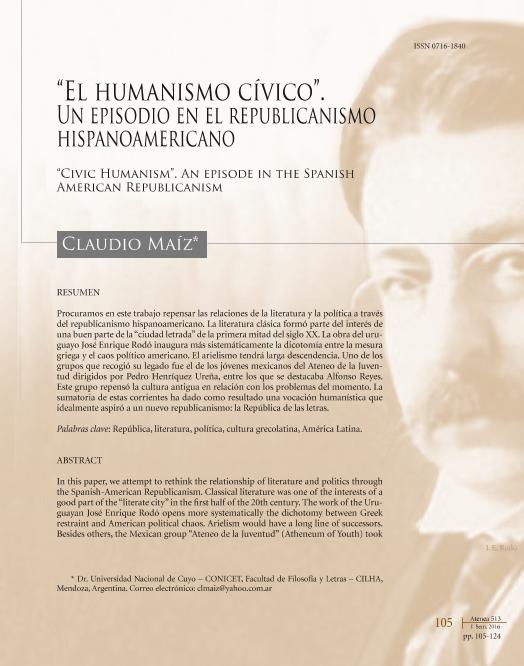Mostrar el registro sencillo del ítem
dc.contributor.author
Maiz, Claudio Gustavo

dc.date.available
2020-06-26T17:00:42Z
dc.date.issued
2016-07
dc.identifier.citation
Maiz, Claudio Gustavo; El humanismo cívico: Un episodio en el republicanismo hispanoamericano.; Universidad de Concepción; Atenea; 513; 7-2016; 105-124
dc.identifier.issn
0718-0462
dc.identifier.uri
http://hdl.handle.net/11336/108327
dc.description.abstract
Procuramos en este trabajo repensar las relaciones de la literatura y la política a través del republicanismo hispanoamericano. La literatura clásica formó parte del interés de una buena parte de la ciudad letrada de la primera mitad del siglo XX. La obra del uruguayo José Enrique Rodó inaugura más sistemáticamente la dicotomía entre la mesura griega y el caos político americano. El arielismo tendrá larga descendencia. Uno de los grupos que recogió su legado fueron los jóvenes mexicanos del Ateneo de la Juventud dirigidos por Pedro Henríquez Ureña, entre los que se destacaba Alfonso Reyes. Este grupo repensó la cultura antigua en relación con los problemas del momento. La sumatoria de estas corrientes ha dado como resultado una vocación humanística que idealmente aspiró a un nuevo republicanismo: la República de las letras.
dc.description.abstract
In this paper, we attempt to rethink the relationship of literature and politics through the Spanish-American Republicanism. Classical literature was one of the interests of a good part of the "literate city" in the first half of the 20th century. The work of the Uruguayan José Enrique Rodó opens more systematically the dichotomy between Greek restraint and American political chaos. Arielism would have a long line of successors. Besides others, the Mexican group "Ateneo de la Juventud" (Atheneum of Youth) took up Rodó's legacy under the leadership of Pedro Henríquez Ureña. From among its young members, Alfonso Reyes stands out. The group rethought the ancient culture in relation to the problems of the time. The sum of these currents has resulted in a humanistic vocation that ideally aspired to a new republicanism: the Republic of Letters.
dc.format
application/pdf
dc.language.iso
spa
dc.publisher
Universidad de Concepción
dc.rights
info:eu-repo/semantics/openAccess
dc.rights.uri
https://creativecommons.org/licenses/by-nc-sa/2.5/ar/
dc.subject
república
dc.subject
cultura grecolatina
dc.subject
América Latina
dc.subject.classification
Otras Historia y Arqueología

dc.subject.classification
Historia y Arqueología

dc.subject.classification
HUMANIDADES

dc.title
El humanismo cívico: Un episodio en el republicanismo hispanoamericano.
dc.title
“Civic Humanism”: An episode in the Spanish American Republicanism
dc.type
info:eu-repo/semantics/article
dc.type
info:ar-repo/semantics/artículo
dc.type
info:eu-repo/semantics/publishedVersion
dc.date.updated
2020-05-11T15:47:02Z
dc.journal.number
513
dc.journal.pagination
105-124
dc.journal.pais
Chile

dc.journal.ciudad
Concepción
dc.description.fil
Fil: Maiz, Claudio Gustavo. Universidad Nacional de Cuyo. Facultad de Filosofía y Letras; Argentina. Consejo Nacional de Investigaciones Científicas y Técnicas. Centro Científico Tecnológico Conicet - Mendoza; Argentina
dc.journal.title
Atenea
dc.relation.alternativeid
info:eu-repo/semantics/altIdentifier/url/https://scielo.conicyt.cl/scielo.php?script=sci_arttext&pid=S0718-04622016000100007
dc.relation.alternativeid
info:eu-repo/semantics/altIdentifier/doi/http://dx.doi.org/10.4067/S0718-04622016000100007
Archivos asociados
